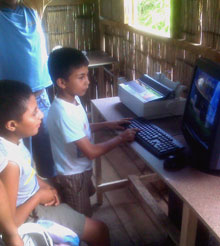
Children in Los Bancos, Ecuador, receive computer training in their new learning center.
By Rob Wood, past president of the Rotary Club of South San Francisco, San Francisco, USA
A few years ago, I learned valuable lessons in sustainability trying to help the people of Los Bancos, a community of about 100 villagers living in extreme poverty in the jungle near Guayaquil, Ecuador.
As president of my club in 2007, I was expected to come up with an international service project and had heard about a new club in Guayaquil looking for an international partner. When I asked them what the villagers needed, they answered “They need everything!”
Of course, by our standards, they did need everything. But if we truly want to help people, we need to be realistic when we organize projects. We need to objectively determine whether or not the people we’re trying to help will be able to manage and maintain whatever it is once we’re gone.
Needs assessment
With some cajoling, I encouraged the local Rotarians to go into the jungle and ask the villagers what they felt they needed. Eventually we received these priorities from the women:
- Chickens. With a chicken ranch they could have fresh meat and eggs whenever they wanted and could sell the chickens and eggs for cash.
- A computer learning center for the children
- A new well and pump house
- Flush toilets
I made my way through the intricacies of the Matching Grant system. The villagers were taught how to raise chickens. The computer learning center (a bamboo hut) was built with funds from the villagers and Guayaquil Rotarians. The hut was filled with computers, work stations, and a network to link them all. Rotaractors taught the children how to use the computers.

The chicken ranch pilot.
A new well was dug, and a new pump house built by a combined force of Rotarians and villagers, and for the first time in its history, the sound of flushing toilets was heard in Los Bancos. (Of course, the villagers continued to use the fields around the village as their bathroom, but they were very proud of their latrine block.)
The computer learning center flourished, and as it turned out, there was an Internet Service Provider in Guayaquil who could build a 200-foot-high tower necessary to reach above the jungle canopy with an antenna on the top, and bring the Internet to the village for a year ─ all for the project’s remaining balance of US$5,000.
So Internet came to the jungle. The students all made their own Facebook pages. We arranged to meet, via Skype, right there in the bamboo hut. Out in the middle of the jungle, in the midst of extreme poverty, the children and their parents, the Rotarians and the Rotaractors, all got to meet my club and other local Rotarians in real time, and not a dry eye in the place.
Set back
Unfortunately, in our case, time passed and it became clear the villagers weren’t quite ready to go into the chicken ranching business. The chickens either died or were eaten by wild dogs and cats. Storms drove rain through the cracks in the bamboo hut, ruining all the computer equipment. Our club leadership changed and so did that of the Guayaquil Rotary club, which turned its attention elsewhere. There was no money to pay the Internet bill.
I have recently reached out to reconnect with my Guayaquil contacts. The tower is still operational and two clubs want to take another run at the project. It’s possible we’ll breathe new life into the effort.
The model we created for US$25,000 was not only sustainable, it could completely revolutionize the way Rotary helps those in need. One effort with four parts ─ clean water, sanitation, training in computer skills, and internet connection linking the village with the world. Each could be a separate project but coordinated by a single club. As many as five clubs could work together making a long-term commitment, sticking with it until the village becomes self-sufficient.
If we are truly going to help, we need to be in it for the long haul. And that’s what sustainability is all about.
- Rotarians join in observing World Water Day 22 March. The Water and Sanitation Rotarian Action Group has developed technical guides to help Rotarians develop sustainable water projects that succeed in the long term. For World Water Day, learn more about the action group and how they can help your project.
- Watch a video on sustainability
- See five steps to make your project sustainable
- Read lessons in sustainability from a collaborative effort in Tanzania

Hi Alex,
What is your overall goal in doing this project?
Best regards,
Rob
LikeLike
I’m happy to report that progress is being made in taking the village of Los Bancos to the next level of this project. In order to truly be sustainable, a project intended to help people living in poverty must have a plan. In this case, the following questions need to be answered:
Question 1: What happens when the pump needs maintenance or repair? Who will do that work? Where will the money come from for parts and tools?
Question 2: What happens when the latrine block septic system or toilets need maintenance, repair or replacement? Who will do the work? Where will the money come from for parts and tools?
Question 3: What happens when the computer network software or hardware needs maintenance, repair replacement? Who will do that work? Where will the money come from for parts and tools? How will the equipment be protected from rain, dust, sand, theft?
Question 4: What happens village mothers in the surrounding areas learn about this “window of hope” Rotary is offering, and want to send their children to the learning center to gain the same opportunity? How will the village handle growth, and success?
Question 5: What happens when the Internet service bill comes due each month, or each year? Who will pay it? Where will the money come from?
Question 6: What happens when the software the village students are learning to use needs to be updated, or new software installed? Who will do that work? Where will the money come from?
Question 7: Who will teach the classes that students will take in order to learn how to use the computers, and the programs installed on them? How will the students progress in their learning from class to class, and from year to year?
There is only one viable answer to all of these questions, and it is this: The people, themselves will do the work, and they will pay for all of these things with their own funds – not with grant money, and not through donations, and not by the generosity of kind Rotarians. Yes, Rotary must set the wheels and gears into motion to enable these solutions to come to pass, but the essence of a true vision for the future is that the people we help must learn to be self-sufficient. We Rotarians cannot provide permanent help to all of the needy people in the world. There aren’t enough of us, and we don’t have the resources to do more than directly help more than a very small percentage of them
But here’s a truth: People living in poverty – even extreme poverty – want to be self-sufficient. They don’t want to have to depend on others to give them resources, but they lack the education, the clean water, the sanitation, the health, the strength, the tools and the resources to make their dreams become reality. That is where we come in. But we must be willing to commit to a project until the people we’re helping no longer need us. That is the lesson of Los Bancos. It may take 20 years of teaching and helping the villagers learn how to become self-sufficient, as the children grow to adulthood drinking clean water, living in sanitary conditions, getting regular medical care, good nutrition, and ongoing education.
Before we set out to truly help a village or community, anywhere in the world, we need to count the cost, and be very careful before we start spinning the Rotary wheel in their lives; because the cruelest act we can possibly commit is to offer hope to people who have no hope, and then a year or two later disappear.
Yours in Rotary
Rob Wood
LikeLike
Hi
I am from Bougainville a provice in Papua new Guinea. Our community is interested in setting up a computer hub and a satelite so we can also teach young children to learn about computer. We are also interested to set uo water supply centres and proper sanitation systems. All in all a solar power system.
Alex Dawia
LikeLike
Excellent article pointing how important it is to followup on projects.
LikeLike
Pingback: Lessons in sustainability from the jungles of Ecuador | Warsaw Rotary , Club 3393, District 6540
Yes…. we need to be realistic when we organize projects.
LikeLike
I believe this blog -Lessons in sustainability from the jungles of Ecuador by Rob Wood, past president of the Rotary Club of South San Francisco, San Francisco, USA, teaches all Rotarians actual meaning of sustainability which is one of the main conditions of Future Vision Plan (Global Grants). Just Fantastic. Lets share this with all our Rotarian friends.
LikeLike